Blockchain Interview Questions And Answers For 2025
4.9 out of 5 based on 9748 votesLast updated on 10th May 2024 21.97K Views
- Bookmark

Whether you're a fresher, or an experienced developer, these Blockchain interview questions will help you to crack the interview.
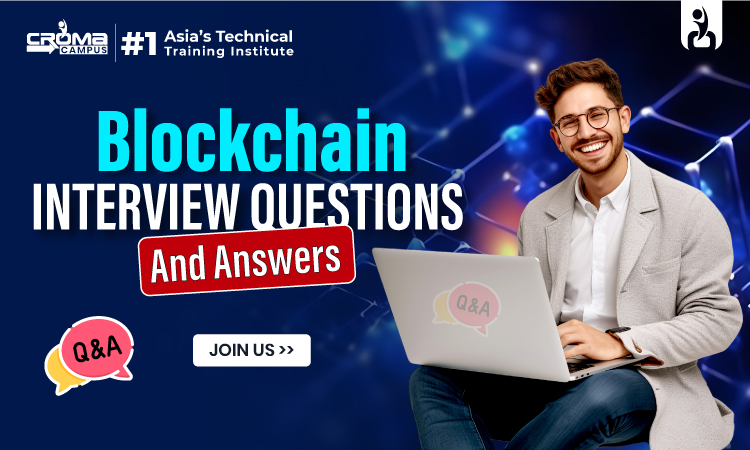
Introduction
As blockchain technology gains traction globally, professionals seeking roles in this field must navigate a complex landscape of concepts, applications, and challenges. Whether you're interviewing in tech hubs like Delhi, Noida, Bangalore, or anywhere else, this resource offers invaluable insights into common interview topics. Training from the Blockchain Course can be especially beneficial for individuals planning a career in this field. From fundamental definitions to advanced technical considerations, we'll explore key aspects of blockchain, including its decentralization, security, smart contracts, scalability, and real-world applications.
Whether you're a fresher, an experienced developer, or an industry enthusiast, this guide aims to equip you with the knowledge needed to ace your Blockchain interview questions.
Important Questions On Blockchain Technology
- What is blockchain technology?
Blockchain is a decentralized, distributed ledger technology that records transactions across a network of computers. Each transaction is securely encrypted and linked to the previous one, forming a chain of blocks, providing transparency, security, and immutability.
- How does blockchain ensure security?
Blockchain achieves security through cryptographic techniques like hashing and consensus algorithms. Transactions are encrypted and linked in a tamper-resistant manner. Consensus mechanisms ensure agreement among network participants, making it extremely difficult to alter data retroactively.
- What are the advantages of blockchain technology?
Blockchain offers transparency, immutability, and decentralization, reducing the need for intermediaries, enhancing trust, and lowering transaction costs. It enables faster, more secure, and efficient transactions, and fosters innovation in various sectors like finance, supply chain, and healthcare.
- Explain the concept of smart contracts in blockchain. (important interview question on Blockchain Technology)
Smart contracts are self-executing contracts with the terms of the agreement directly written into code. They automatically execute and enforce the terms when predefined conditions are met. Smart contracts eliminate the need for intermediaries, reducing costs and enhancing efficiency in contract management.
- What are the challenges facing blockchain technology?
Scalability, interoperability, and regulatory concerns are major challenges for blockchain adoption. Scalability issues arise due to the increasing volume of transactions, while interoperability challenges stem from the compatibility of different blockchain platforms. Regulatory uncertainty and compliance issues also pose hurdles to widespread adoption.
Above are some of the most important questions on Blockchain technology.
Note: If you are staying in Delhi/NCR and looking for Blockchain Training in Noida, Do visit Croma Campus and get free consultation and the best course as per your requirements. We do provide 100% job assistance as well.
Interview Questions For Blockchain Developers
- What programming languages are commonly used in blockchain development? (important Blockchain Developer interview question)
Solidity is widely used for Ethereum smart contracts, while languages like Java, C++, and Python are common for blockchain platform development. Familiarity with multiple languages is beneficial for adapting to different blockchain ecosystems.
- Explain the concept of consensus algorithms in blockchain. (important question on Blockchain)
Consensus algorithms ensure agreement among network participants on the validity of transactions. Examples include Proof of Work (PoW), Proof of Stake (PoS), and Delegated Proof of Stake (DPoS). Each algorithm has its strengths and weaknesses in terms of security, scalability, and energy efficiency.
- What are some security best practices in blockchain development?
Secure coding practices, cryptographic techniques, and regular security audits are essential. Implementing role-based access control, data encryption, and multi-factor authentication enhances security. Smart contract auditing and testing tools help identify vulnerabilities early in the development process.
- How do you handle scalability issues in blockchain development? (important interview question for Blockchain Developer)
Techniques like sharding, sidechains, and off-chain solutions can improve scalability. Sharding involves partitioning the network to process transactions in parallel, while sidechains enable transactions to be processed independently. Off-chain solutions like state channels and payment channels reduce the burden on the main blockchain.
- What role does decentralized finance (DeFi) play in blockchain development?
DeFi leverages blockchain technology to create decentralized financial applications, including lending, borrowing, and trading platforms. Blockchain developers contribute to building these applications, ensuring security, efficiency, and interoperability with other DeFi protocols. Understanding smart contracts and blockchain interoperability is crucial in DeFi development.
These were some of the commonly asked Blockchain Developer interview questions.
Tips: Blockchain technology revolutionizes industries by providing secure, transparent, and decentralized systems. A Blockchain Certification can enhance your career, demonstrating expertise in this emerging field.
You May Also Read These Posts:
How Blockchain Technology Works
How To Get A Blockchain Certification
Blockchain Course Syllabus And Modules
Blockchain interview questions For Freshers
- What is blockchain and how does it work?
Blockchain is a decentralized ledger technology that stores transactional records across a network of computers. Each transaction is securely encrypted and linked to the previous one, forming a chain of blocks. Consensus mechanisms ensure agreement among participants, making data immutable and transparent.
- Explain the concept of decentralization in blockchain. (important Blockchain interview question and answer)
Decentralization means there's no central authority controlling the network. Instead, data is distributed across multiple nodes, making it difficult for any single entity to control or manipulate the system. This enhances transparency, security, and resilience in blockchain networks.
Note: Croma Campus is one of the leading EdTech companies for providing Blockchain Developer Training. You can check the details about the course, fees and duration.
- What are the types of blockchain?
Blockchain can be categorized into public, private, and consortium (or hybrid) blockchains. Public blockchains are open to anyone, private blockchains restrict access, and consortium blockchains are governed by a group of organizations.
- What are smart contracts and how do they work?
Smart contracts are self-executing contracts with terms written in code. They automatically execute when predefined conditions are met, without the need for intermediaries. They run on blockchain networks, ensuring transparency, security, and efficiency in contract execution.
- What are the potential applications of blockchain technology?
Blockchain has applications across various industries, including finance (payments, remittances), supply chain (tracking, authentication), healthcare (patient records), and voting systems. Its decentralized and transparent nature makes it suitable for any use case requiring secure and tamper-proof record-keeping.
These were the most important Blockchain interview questions For Freshers.
Tips: Cryptocurrency is revolutionizing the financial world. With Cryptocurrency Online Training, you can gain the knowledge and skills to understand and navigate the digital currency landscape.
Blockchain interview questions For Experienced
- How do you address the scalability challenges in blockchain networks?
Implementing techniques like sharding, layer 2 solutions, and off-chain scaling helps alleviate scalability issues. These approaches enable blockchain networks to process a higher volume of transactions without compromising decentralization or security.
- Explain the importance of consensus algorithms in blockchain networks.
Consensus algorithms ensure agreement among network participants on the validity of transactions. Algorithms like Proof of Work (PoW) and Proof of Stake (PoS) establish trust and prevent double-spending in decentralized environments.
- What are some common security vulnerabilities in blockchain applications, and how do you mitigate them? (important Blockchain interview question and answer)
Vulnerabilities such as reentrancy, front running, and smart contract bugs can compromise blockchain applications. Employing secure coding practices, conducting thorough audits, and implementing role-based access controls help mitigate these risks.
- How do you ensure interoperability between different blockchain networks?
Utilizing interoperability protocols like cross-chain communication protocols (CCCP) and blockchain bridges facilitates seamless interaction between disparate blockchain networks. These solutions enable the exchange of assets and data across multiple blockchains.
- What role do governance models play in blockchain ecosystems?
Governance models define how decisions are made and protocols are updated within blockchain networks. Whether through on-chain governance mechanisms or off-chain governance structures, effective governance ensures transparency, decentralization, and community participation in network management.
These were some of the most commonly asked Blockchain interview questions For Experienced.
Note: Bitcoin, a decentralized digital currency, offers secure and fast transactions. Enhance your knowledge with Bitcoin Online Training to understand its blockchain technology and market trends.
Conclusion
In summary, blockchain technology continues to revolutionize various industries with its decentralized, transparent, and secure approach to data management. The Blockchain Developer Course in Delhi is a highly sought-after professional training course that ensures the best training and placement opportunities. Moreover, one can check the Blockchain interview questions to gain detailed insight into the question patterns and their answers. As scalability improves, security measures strengthen, and interoperability advances, blockchain's potential for innovation and disruption only grows, promising a future of greater efficiency, trust, and inclusivity.
Subscribe For Free Demo
Free Demo for Corporate & Online Trainings.
Your email address will not be published. Required fields are marked *
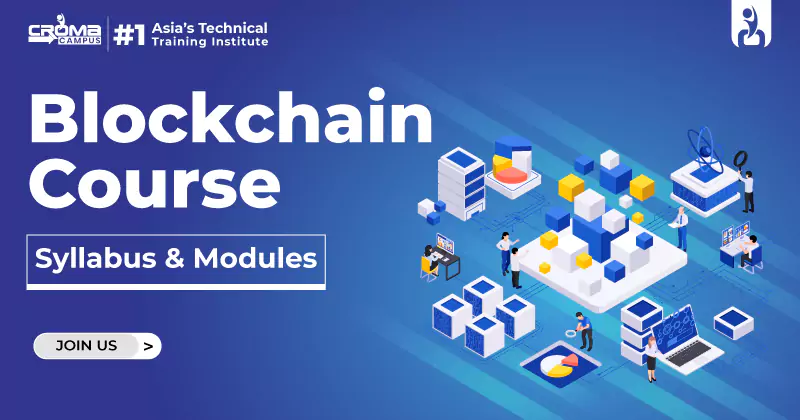
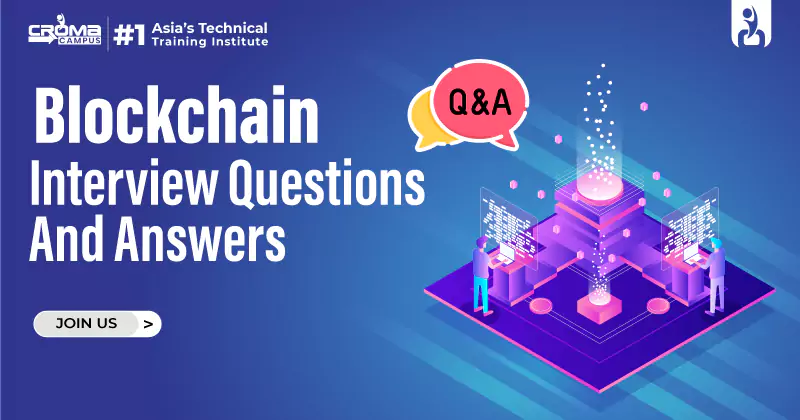
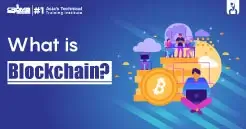
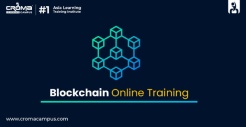
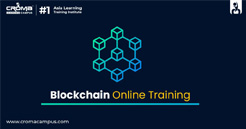



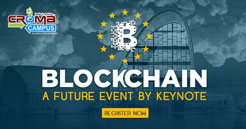










 Master in Cloud Computing Training
Master in Cloud Computing Training